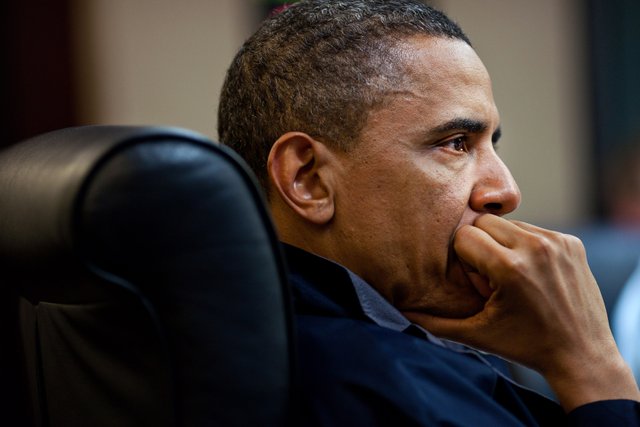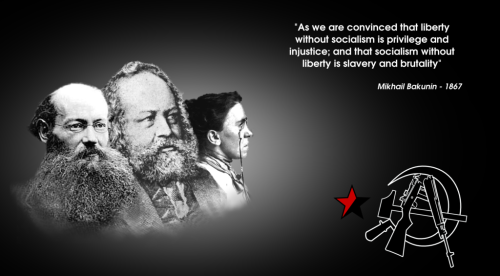How I Realized I Am An Anarchist
I used to be a pretty typical Democrat. I sort of inherited it from my grandfather, who worked in government. A political consciousness of my own didn't really emerge until the run up to the invasion of Iraq. Reading blogs and news over the years helped me to develop a sensibility that I keep with me to this day, and a foundation of knowledge that provided an underlying substance for the positions I took.
I was frequently disappointed in the Democrats during the Bush administration. Their cowardice was infuriating at times, as they would cave in to Republican demands without a fight. My hope was that when they took back the White House, they would start to show a bit of snarl, and push back against the attacks on the working class that I had been watching my entire adult life.
The Obama election was a cause for optimism, as many of his campaign promises were sorely needed... Get out of Iraq, close Guantanimo, roll back tax cuts for the mega-wealthy, and make strides in the fight against climate change. But my optimism was short lived... His appointments signaled business as usual, as he kept Bush appointments in cabinet level positions, appointed Republicans to others, and surrounded himself with conservative Democrats. It came out that he was given the option of bailing out homeowners with some of the TARP funds, but he chose to use all the funds to bail out the banks. His stimulus was half tax cuts, which blunted its effectiveness. He barely faught for the public option when he negotiated his health care plan. He had his sights set on a grand bargain to weaken social security.
My sense of betrayal was overwhelming at times. I felt utterly hopeless and there was no clear way for me to effectively express my disillusionment and outrage. After a summer that saw the president sell out the most vulnerable citizens during hostage negotiations over the debt ceiling, a purely manufactured crisis, I was at the end of my rope with the Democratic party. The political establishment is clearly incapable of functioning in a way that benefits the working class.
In September, the Occupy movement started up in New York, right on Wall Street. I figured they wouldn't last long, but to my surprise they were getting stronger. Much of my concerns were given voice, and even broke through into mainstream media. For the first time that I could remember, the debate shifted from the debt and deficit to matters of income inequality and government corruption. When I learned that the movement had spread to other cities and gaining even more momentum, I knew I had to be involved. I discovered that an encampment had been established in Washington, DC, and I went to visit it one night after work and check out the General Assembly.
It is an unfortunately reality that most people have never really experienced democracy in any meaningful sense. We are taught to accept that "democracy" means waiting in line every 2 or 4 years to press a button indicating your preference of predetermined choices. It was incredibly refreshing to watch democracy in action in the Occupy camp. It was my first exposure to the consensus process, a form of group decision making which attempts to result in a dynamic compromise that takes into consideration the concerns of all participants and comes up with a solution that everybody can live with. In a situation where everybody was free to contribute in a manner of their choosing, some really amazing things were happening.
Communal meals were cooked and served. Donations were collected and distributed to people who needed warm clothing and other personal items. An apparatus for media outreach was developed, the park was wired for wifi, marches and other actions were planned, a medical tent was built, and countless other projects were underway.
I worked on the Declaration of Occupy DC, which was a tortuous experience. Writing is a solitary activity, and writing as a group is incredibly difficult. I felt that we ended up with a watered down product. I wish we had stated things more forcefully in spots... but overall I was proud to be a part of it. It was alright.
When that was finally complete, I had a lot more time on my hands to attend some of the numerous teach-ins and attend meetings from a few of the other committees. Up to this point I had been fairly limited in the range of my involvement, because I was still working full time. I began to speak with a lot of people that identified themselves as anarchists. Far from the popular image of a molotov weilding crust punk anarchist, many of them were downright bookish looking intellectual types. That piqued my interest somewhat... and a lot of what they said rang pretty true for me.
I learned that anarchism was a political movement that grew out of the international socialist movement of the 19th century. It differentiated itself from the rest of the movement by its refusal to attempt to seize the powers of the state. The anarchists realized that the state was constitutionally incapable of providing for the liberation of the masses. Taking control of the state would result in a new ruling class, new oppressors, but nothing resembling freedom for the common man. The anarchists advocated for a form of prefigurative politics that created a new world in the shell of the old. The way we organize ourselves must be compatible with the future that we are trying to create.
I read some of the great works of anarchists, like Kropotkin's Conquest of Bread. The book Black Flame gave me an overview and context for anarchism throughout history and some of the different strains of thought. I began to spend more and more time among the anarchists who talked about theory and direct action, and less with the liberals and progressives. I found the status quo increasingly repugnant, and I was coming to understand that liberals are a privileged class. They can afford to continue with things as they are, and they tend to give lip service to the ideals that I wanted to pursue with urgency... Whereas liberals say they want equality and desire to make things better for the poor, they want to do it at a leisurely pace that doesn't threaten the political establishment and economic system. Liberals are counter-revolutionary by nature. I had enough of that.
I eventually realized that the system was completely inadequate for achieving the goals that people like me had. The government is the tool of the wealthy. It is the means by which social stratification is established and maintained. The extent to which it functions to improve the lives of the working class and poor, it does just enough to prevent widespread unrest. Maintaining the illusion of freedom and justice is necessary for the continued exploitation of the masses. I finally accepted that I was, in fact, an anarchist.



Welcome to steem island an anarchist heaven
the crypto world is anarchist heaven :D
I also read "Black Flame " :)
It's a great book! I learned quite a bit.
Thought you said you were a Marxist...
Cg
Yes, an autonomist.
https://en.wikipedia.org/wiki/Autonomism
I personally don't class this as anarchy
Cg
Do you think that anarchism is viable for large groups of people? I mean, you said how difficult it was to write with just the OCcupy group which resulted in a product that was, in your opinion, inferior. I guess that doesn't mean that the group couldn't have just decided to outsource the job by election to a good writer whose authority would then be justified. But I feel like direct democracy can and does result in an inferior product because a lot of the time it uses the lowest common denominator.
I think that it can work on a small tribal scale but I'm not sure how it would look with millions of people? I haven't read any of the literature, though, just chomsky interview :P
There have been attempts at large societies built around anarchist principles, but they typically got crushed by outside forces.
The writing was uniquely challenging. Food distribution, building structures, and planning actions were much easier.
Great write up, @bacchist! Glad to see more #anarchy and #anarchism posts getting some love. :)
I am an anarchist too. I realize couple years ago. That's why i love crypto.
welcome to steemit and enjoy our free speech heaven as anarchist
Maybe you should read the Leviathan of Thomas Hobbes. Anarchism means homo homeni lupus, the man is a wolf to the man. In this state of nature only the strong having a happy life. The weak must suffer. It is the state by contract, the rule of order, that is ending this anarchy and brings peace to the people. Do you think, that in an anarchy there would be no crime?
The only true and viable form of anarchism is anarcho-capitalism. Anarcho-socialism is a contradictory mess.
one name: stefan molynuexx
I learned so much from him... Back when he was an anarchist. Heheh.